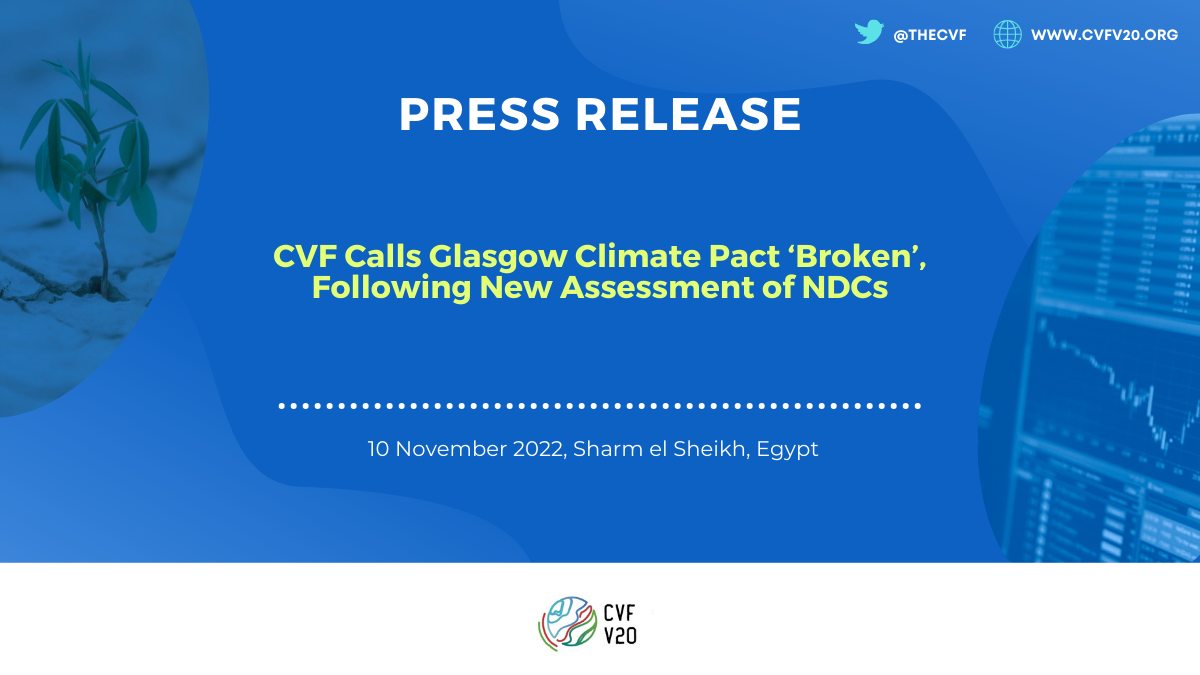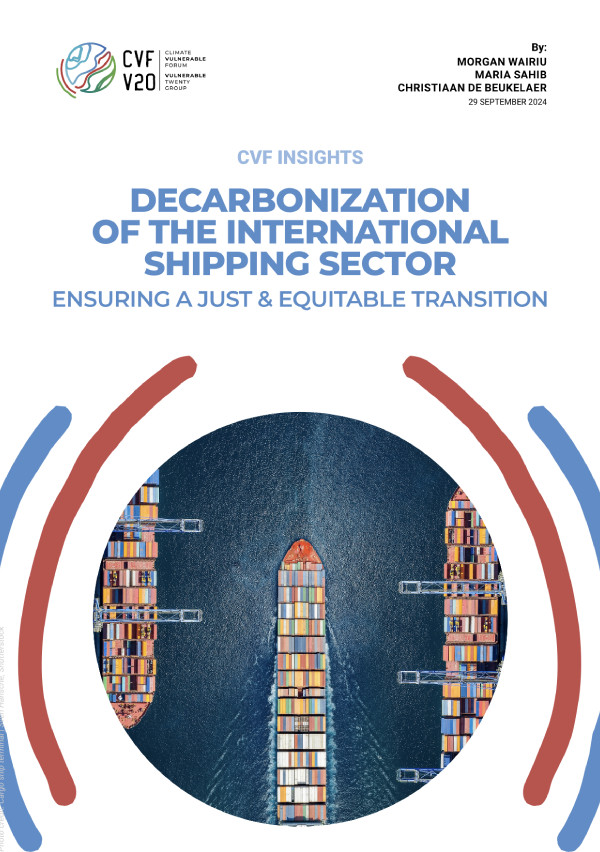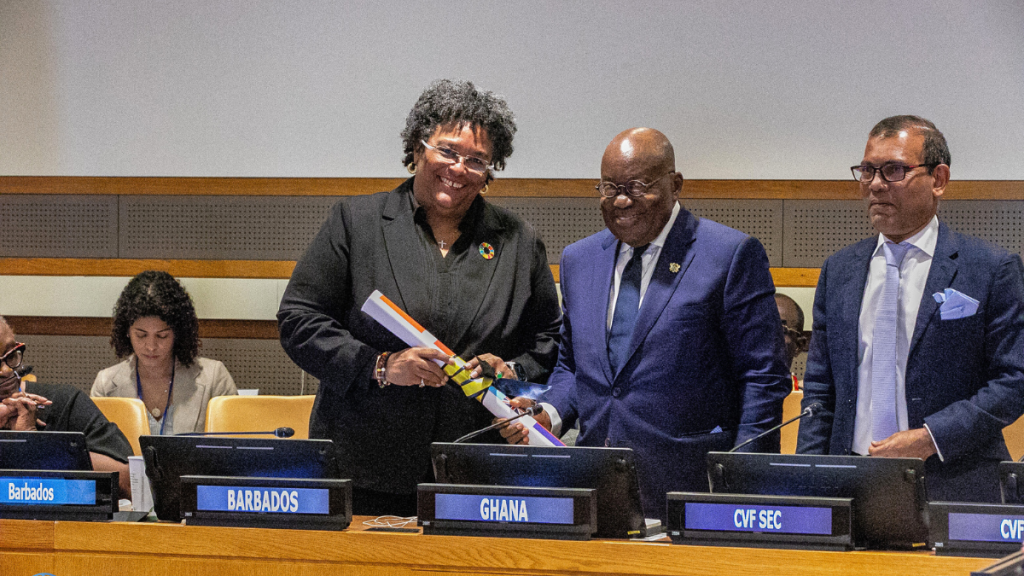New ‘Traffic Light’ Report Finds Major Economies Stuck on Red: CVF Analysis Shows 2030 NDCs Lead to a 3ºC World
LDCs, Africa Group and Climate Vulnerable Forum NDCs Already 1.5ºC-Compliant on a Fair Shares Basis
10 November 2022, Sharm el Sheikh, Egypt – The Climate Vulnerable Forum (CVF) today at COP27 issued a major new report which uses a traffic light approach to show that G7 and G20 major economies are stuck on ‘red’ in terms of their NDCs’ alignment with the 1.5ºC goal of the Paris Agreement.
In contrast, vulnerable country groups including the African Group, the LDCs, and the CVF itself are all on ‘green’, indicating that their NDCs are already fully compliant with the Paris Agreement, and fully aligned with a 1.5 degrees world.
The groundbreaking report, entitled “Paris Goals NDC Alignment ‘Traffic Light’ Assessment”, differs from most assessments in that these often unfairly grandfather carbon budgets by taking current (i.e. 2022) emissions as a starting point. In accordance with the principle that every human being has an equal access to and responsibility for the atmosphere, the new CVF report calculates carbon budgets using the UN Climate Convention’s base year of 1990, when the first IPCC report was produced, as a starting year. These budgets are then adjusted using both GDP and the Human Development Index to account for countries’ differing capacities to undertake emissions cuts.
The report shows:
- The G7, with 25% of current emissions, has taken the world on track for more than 3ºC of warming with its members’ NDCs having already fully exhausted its 1.5 ºC carbon budget on a fair shares basis.
- The CVF, with 5% of global emissions and 1.5 billion total population, is however fully compliant with the Paris Agreement 1.5ºC goal on a fair shares basis.
- Currently the COP27 negotiations imply that the Africa Group, LDCs, and CVF nations not only already have their atmospheric space taken by richer countries, but will also not be provided sufficient, much-needed adaptation finance and loss and damage funding even as they suffer accelerating climate impacts caused by those who have already long exceeded their carbon budgets.
- COP26’s Glasgow Climate Pact bound all countries to review their 2030 NDC targets in 2022 for alignment with 1.5ºC and to strengthen those that fall short this year.
- This report shows that the G7 for example would have to cut its emissions by 82% below current levels immediately, and 91% below its 2030 NDC targets, to be 1.5ºC compatible on a fair shares basis.
- The Umbrella Group would need to cut its current emissions by 95%, and be 107% below its 2030 NDC targets (i.e. becoming carbon negative), to be 1.5ºC compatible on a fair shares basis.
Speaking at COP27, Executive Director of the Environmental Protection Agency and Special Envoy of the CVF Presidency of Ghana, Hon. Dr. Henry Kokofu, said:
“The Glasgow Pact bound all countries with 2030 NDC targets not aligned with 1.5 to strengthen these this year. With this report, we can see that the Glasgow Climate Pact is broken. Because the rich and big polluting countries did not act to save 1.5 degrees as we all agreed only a year ago in Glasgow.
“Despite being least responsible for past emissions and having the least capacity, the world’s vulnerable nations have already put in a major effort to align our national climate targets for 2030 with the Paris Agreement. The world’s rich and powerful nations however are far off from a fair-share effort to limit warming to within the crucial 1.5ºC Paris goal, which we consider as a survival threshold.”
Also commenting at COP27, the Chair of the CVF Expert Advisory Group Dr. Saleemul Huq stated:
“The world’s rich and powerful nations have failed the world. They have plunged us deep into the climate crisis. They have to take responsibility not just for cutting emissions today, but for the failure to act sufficiently since the UN Climate Change Convention was first adopted in the early 1990s.”
The CVF’s assessment released today is the start of a broader work program commissioned by the Forum, which will present additional results in Spring of 2023.
Dr. Yann Robiou du Pont, the report’s author, commented:
“The assessment shows that large per capita emitting countries, who are responsible for the overwhelming majority of global emissions, must urgently strengthen their targets for 2030 if climate catastrophe, caused by exceeding the Paris Agreement temperature goals, is to be averted. Smaller per capita emitters have pledges well within their fair share of the 1.5C goal.”
He added that the assessment was based on a specific methodology and that it was a new contribution to the field of climate mitigation equity, where a number of other methodologies have been advanced by different authors and expert groups.
NOTES TO EDITORS:
- Because emissions cuts on this scale by the G7 and rich countries are far above the level of their current Paris targets, while the CVF, Africa Group and LDCs are already on committed pathways for lowering emissions, an equitable response can also be supported large-scale financial assistance to the mitigation and adaptation efforts of those who will never use their fair allocation of the global 1.5-degree carbon budget.
- Many CVF countries are beginning work on Climate Prosperity Plans, indicating their own ambitious including carbon negative strategies prior to mid-century (case of Sri Lanka). Bangladesh and Sri Lanka have already completed initial plans, indicating $100bn of investment needs in clean infrastructure in these two countries alone. Rich countries must assist in debt restructuring, access to capital on concessional terms and other financial measures to make such ambitious plans a possibility
A copy of the report can be consulted here.
About the CVF
The Climate Vulnerable Forum (CVF) is an intergovernmental non-treaty organization of 58 developing nations most threatened by climate change and represents some 1.5 billion people worldwide. It is currently chaired by Ghana for the period 2022-2024. The Forum serves as a South-South cooperation platform for participating member states to act together to deal with the global crisis of the climate.
For more, visit:
CVF Member States
Afghanistan, Bangladesh, Barbados, Benin, Bhutan, Burkina Faso, Cambodia, Chad, Colombia, Comoros, Costa Rica, Côte d’Ivoire, the Democratic Republic of the Congo, Dominican Republic, Eswatini, Ethiopia, Fiji, the Gambia, Ghana, Grenada, Guatemala, Guinea, Guyana, Haiti, Honduras, Kenya, Kiribati, Kyrgyzstan, Lebanon, Liberia, Madagascar, Malawi, Maldives, Marshall Islands, Mongolia, Morocco, Nepal, Nicaragua, Niger, Palau, Palestine*, Papua New Guinea, Philippines, Rwanda, Samoa, Saint Lucia, Senegal, South Sudan, Sri Lanka, Sudan, Tanzania, Timor-Leste, Tunisia, Tuvalu, Uganda, Vanuatu, Viet Nam, Yemen.
*As a UN non-member observer state
Media Contact:
Mr. Paul Roberts, CVF Communications Advisor +960 765-4337 (Mobile/WhatsApp)




